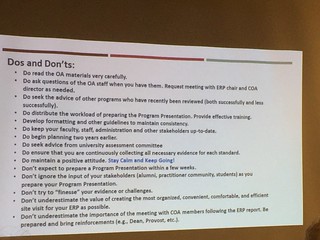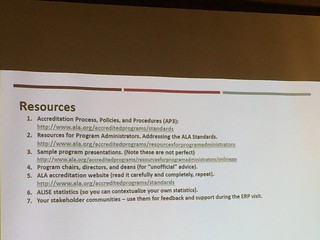Description:
Accreditation is a process of self-evaluation, which provides a unique opportunity for a school to assess the quality of its academic program and public accountability against ALA standards. It is a voluntary, collegial undertaking that involves peer- and community-assessment of the program and its outcomes. A school engages deeply with a range of communities (e.g., faculty, students, alumni, and employers) during the evaluation process to assess program outcomes. So, what does accreditation self-evaluation and assessment process entail? What are faculty roles and responsibilities during the accreditation review process? What strategies should a school use to prepare its program and communities/stakeholders for continued accreditation? What are the roles and responsibilities of school program administrators? How are you planning for the ALA accreditation review? What are the perspectives of ERP (External Review Panel) members? What’s the best that could happen and what to do next? What’s the worst that could happen and how to plan for the next step?
Dania Bilal - Univ. of Tennessee
- Have you ever wished that your program was not ALA accredited?!
- She was an interim director, who then had to oversee the process.
- Many of the efforts were underway already.
- Established a Steering Committee and a Data Managmenet Task Force.
- They has a committee for each chapter: faculty, staff, students, and advisory board members.
- They had to collect more data (missing data). How do you show that you are doing something when you don't have the data to show.
- She found the resources on the Committee on Accreditation (COA) web site to be extremely helpful.
- They prepped faculty, students and staff before the ERP visit.
- They put all of their supporting materials on a Sharepoint site, which ERP members could access.
- She found it very helpful that she had gone through information about the program over the last seven years.
- The ERP visit is not the end. There is also the meeting with COA members at the ALA conference.
- She felt that she learned a lot by going through the process.
Heidi Julien - University at Buffalo
- Accreditation is about two things: evidence and relationships. She is focusing here on relationships.
- Faculty -
- Engage faculty early and thoroughly. Talk about the process and take away the mystery. Educate them.
- Provide monthly assessment updates.
- Ask faculty for feedback on the biennials.
- Making the program presentation collaborative,p is helpful, in her opinion.
- Also need to prepare other stakeholders: Faculty, staff, students, alumni, practitioner community, dean/provost, advisory board, custodial staff
- Engage in a process of deliberate conversation with the stakeholders about the process. Ask them for feedback and support. Clarify your expectations for their involvement during the visit.
- Emphasis the importance of the process.
- Emphasis the importance of active and positive participation during the ERP visit.
- UB crested a high profile Accreditation Advisory Committee.
Vicki Gregory - Univ. of South Florida
- She has been on both sides of the process: as part of program going through the accreditation process and as a member of COA and ERP.
- She sees problems in how people use the data from their outcomes to show how they are improving their program.
- It is up to the program to make their program understandable to the ERP. For example, limit your acronyms or have a thesaurus.
- Don't try to hide your flaws. They will come out. It is better to address them upfront. Talk bout what you are doing to make it better.
- Thoroughly explain the curriculum and how it fits together for the students. Panel members don't necessarily understand certification issues as they pertain to your state. Anything that is specific to your location must be adequately explained for outsiders.
- Always have someone around you who is knowledgeable enough on site to gather and present data at during the ERP visit.
- Don't schedule every moment of the ERP's time.
- Know that COA looks at everything in detail. They will ask detailed questions. They will find and raise their own concerns.
- The process should help you understand the resources your program needs, and make a case with your administration for those resources.
Denice Adkins and Sanda Ezdelez - Univ. of Missouri
- Missouri was on a conditional and then they lost accreditation , and this is where the story states.
- Don't panic. Assess your situation calmly.
- Do be prepared for emotion. Dont do anything you will regret later.
- They had to tell their faculty and their larger community.
- Their alumni were able to explain the value of the program in the state to the school administrators, and really supported the program. The administrators were then able to sell the argument to other people.
- Do seek support of your university administration as you go through the appeal process.
- Don't ignore your public relations and social media presence.
- Do control the messages you send out, to make sure they're positive.
- They worked with the legal counsel for the university. The legal counsel asked that the limit how much information was shared.
- They did road trips across Missouri to talk with people face-to-face about the situation.
- Do review all the documentation related to your case.
- So seek legal counsel.
- Do read the documentation about the Appeal Process.
- Reach out to other programs who have been in silimiar situations.
- Talk to previous COA members,who have been through the Appeal Process.
- Be sure to follow the process.
- Do review the AP3 prior to your hearing.
- Do review your documentation and LAN your strategy prior to your hearing.
- Don't attend your hearing alone. They had about eight people attend the meeting.
Kristin Eschenfelder - Univ.of Wisconsin-Madison
- When should you collect date? All the time!
- What should you collect?
- They have to develop a culture of assessment. You are collecting data all the time and seeking to use the data to support/improve your program.
- Step 1: understand/set program level learning outcomes, strategies goals.
- Have a way of knowing if your strategic goals (priorities) are measurable and if you can say if your met them or not.
- Step 2: data collection
- Systematize it. Make it part of the work that is done.
- Don't just collect it. Know how you will label it and how you will find it.
- They have an ongoing assessment committee.
- Step 3: They have an annual assessment report, which includes short term analysis. She sees this as an intermediate step to the biennial report. Their assessment report is posted on their web site.
- Step 4: decision-making. You should use the data to make decisions and then document the decisions.
- She collects information in bins organized by the standards.
- They collect many student data.
- Data around the curricula and how it relates to stakeholders,employment needs, etc.
- There is some data they collect annually and some that is collected on a rotating basis.
- Document your improvements based on data.
Dos and Don'ts:

Resources:

Q& A:
- What data managment or accreditation management system are people using?
- What is the role of the Accreditation Steering Committee?
- Comment - Have someone who will keep accreditation in mind as decisions are made, and who will look at those decisions from an accreditation point of view.
- Vicky, what are exemplary or positive experiences you've had as an COA or ERP member? When the document is is good shape, before you arrive. Usefully a positive experience. Eileen Abels, former ERP member, says a stressful period is when you ask for data close to the visit. Helpful if everything says cordial.
- Comment - The end point of the process should be mechanical. Collect data and documentation along the way.
- Comment - The ERP fact checks the program. It does not make a recommendation. It is up to the COA to review everything and make a decision.
Presentations from today will be made available. (I believe on the ALISE web site.)
No comments:
Post a Comment